Welcome to learn Mandarin online in Lesson 4 (Unit 1) of SKMLifestyle’s Chinese Language course. In the very beginning I assured you that I’d teach you functional Chinese that’d hopefully help you to thrive in China. To put it simply, the more time you spend with these lessons, the better your life will be in China. In fact, by now we have already gone through around 60-70 basic Chinese words (and characters). In this lesson I’ll be taking you further ahead and we’d learn more on how to learn Chinese fast. As always, I’d urge you to follow the lessons in sequence (check out all lessons from Unit 1). You can find insightful background information on Chinese language and culture in Unit 0.
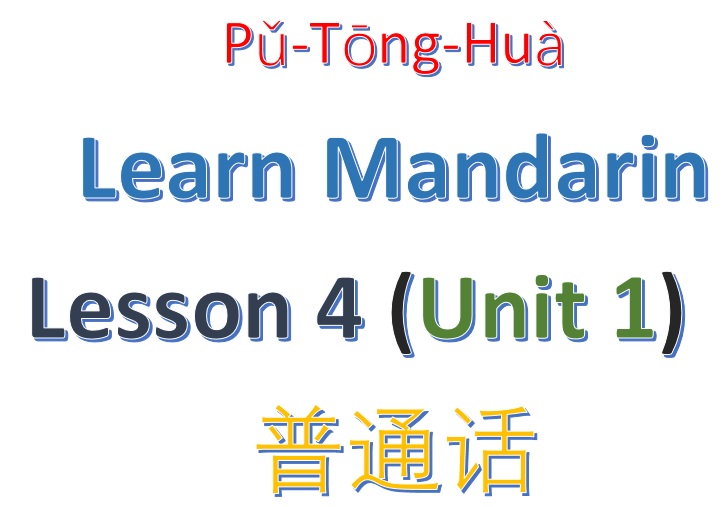
Small, Heart, Flames and forest fire are the basic Chinese words
Now we already know that fire is written as 火 (hǔo). I told you that there are so many words that can be derived from one basic character. Let’s learn more characters that can be derived from 火. For example, small in Mandarin Chinese is written as 小 (Xiǎo). So a small flame is denoted as 小火 (Xiǎo hǔo).
Heart (of humans) is written as 心 (Xīn). Can you guess what is 心火 (Xīn huǒ)? Well, it means something like heat in the heart (anger or internal anger). Similarly, 大火 (Dà hǔo) means big flame. How about山火 (Shān hǔo)? Well, as you can guess, 山火represents a forest fire.
You have just been introduced to two new characters in this lesson – 小 and 心. Don’t they look quite similar? But they are of course not the same. Can you guess what is 小 心 (Xiǎo Xīn)? It means precaution (indirectly related to “small heart”). If you visit a lake in China, you are all set to see 小 心written on various sign boards to ask you to be careful about the presence of water (for example, the water may be deep or cold).
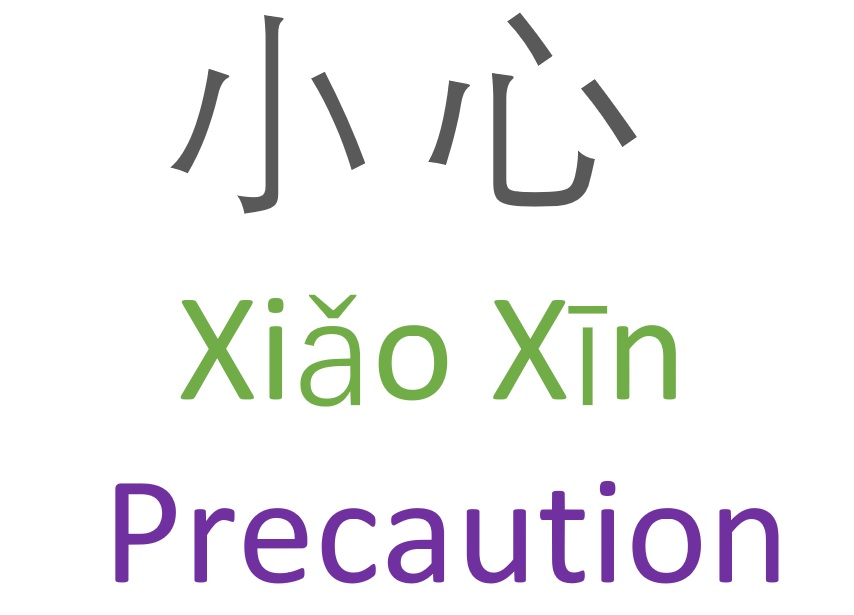
How about 心大 (Xīn Dà – big heart)? I asked this question to my one of my native Chinese colleagues, and he told me that this is an informal word. It’s mainly used in the informal communication to refer to a person who is kind or relaxed (something close to “cool” in English).
Another important term worth knowing is 站 (zhàn) which means “station”. Zhàn can be used with both bus and train station names (but not for the airports). Can you now guess how we could write railway station in Mandarin Chinese? It’s simple – 火车站 (huǒ chē zhàn). Similarly, the subway stations and bus stops’ names also include 站.
Center – Shopping in china
An another very important Chinese character is 中 (Zhōng). It’s so important that I’ll have a separate lesson explaining the relevant nuances. It generally means center/middle/medium. If you like hovering around shopping malls, then you need to know that quite a few shopping malls across Chinese cities are named as 中心 (Zhōng xīn) which basically means – Center (literally the heart of center). Let me tell you name of probably the most famous shopping malls in Suzhou – its Suzhou Center (苏州中心 – Sūzhōu Zhōng xīn). In general, the terms like Sports Center, Olympic Center, Research Center, etc. would have 中心 associated with them.
vehicles
The generic term for a car/vehicle is 车 (chē). When I started leaning basic Chinese words, 车looked confusing to me. Guess why? Well, 车 looks similar to the character for East (东, dōng – I hope you still remember Mandarin Chinese characters from Lesson 1 🙂 ). But, again, these two characters are not the same. Let me put them together for a closer look – 车东.
Anyways, there are so many types of vehicles in China, and most of them seem to be named with 车 as suffix (including bicycle). I’ll write a dedicated lesson about vehicles in the future. But let me tell you more about some of its applications briefly.
Train and stations
Do you know how “train” is written in Mandarin Chinese? The term for a train is based on the historical fact that until a few decades ago, trains were driven by fire. Train is written as 火车 (huǒ chē) – a fire driven vehicle or a vehicle that operates using fire.
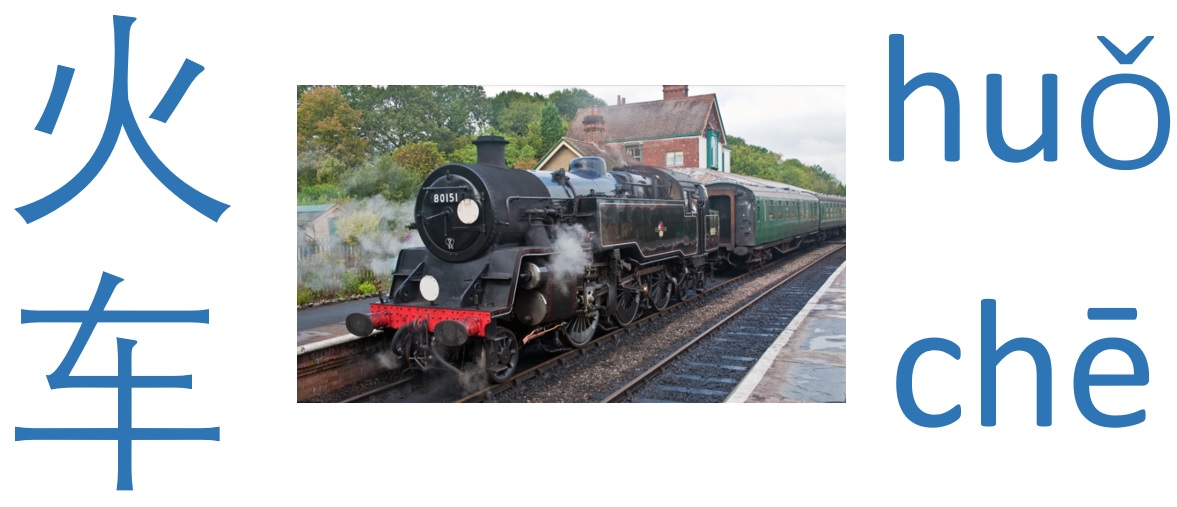
Another important term worth knowing is 站 (zhàn) which means “station”. Zhàn can be used for both bus and train (but not for the airports). Can you now guess how we could write railway station in Mandarin Chinese? It’s simple – 火车站 (huǒ chē zhàn). Similarly, the subway stations and bus stops’ names also include 站.
Railway stations names
China is a big country and there are different railway routes connecting various Chinese cities. These routes usually contain quite a few stations. The names of the Chinese railway stations are often based on the corresponding cities. This is similar to the university names I discussed in Lesson 3. As of now we already know how to write the names of so many Chinese cities.
So can you guess how to write Suzhou Railway Station? Well, it’s simple -苏州火车站 (Sūzhōu huǒ chē zhàn). Let me quickly show you the names of some important railway stations in Chinese cities-
- Suzhou Railway Station -苏州火车站 (Sūzhōu huǒ chē zhàn)
- Beijing Railway Station-北京站 (Běijīng huǒ chē zhàn)
- Nanjing Railway Station-南京站 (Nánjīng huǒ chē zhàn)
- Hangzhou Railway Station-杭州 (Hángzhōu huǒ chē zhàn)
Let me remind you – if you are coming to China, and intend to use bus/trains for travelling in the mainland, these words could be extremely useful. For example, you can just ask your taxi driver to go to a particular railway station, the rest he’d take care of. 🙂
Multiple stations in the Chinese cities
Since Chinese cities are usually very big (both area and population wise), it’s very common that each of the Chinese cities has more than one station. There are multiple stations to cater the needs of the locals. For example, Suzhou has four intercity railway stations, such as Suzhou Station, Suzhou North Station. Can you now guess now how to write these names in Chinese? Fret not, I’d write them down soon for you.
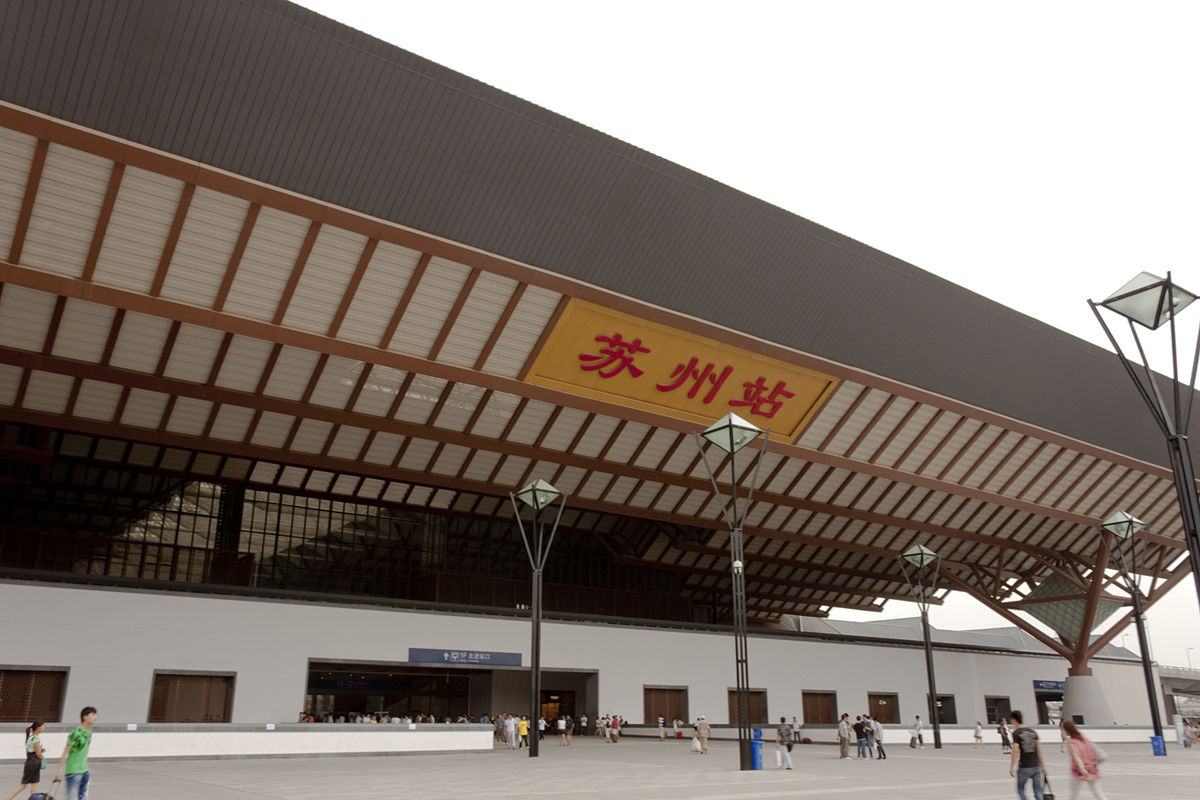
Like any other Chinese city, Suzhou is a big city. Its broadly divided into three geographic regions – Suzhou Old Town, Suzhou New District, and Suzhou Industrial Park. Now let me show you the names of stations in Suzhou-
- Suzhou station- 苏州火车站 (sū zhōu huǒ chē zhàn)
- Suzhou North Train Station- 苏州火车北站 (sū zhōu huǒ chē běi zhàn)
- Suzhou New District Station- 苏州新区站 (sū zhōu xīn qū zhàn)
- Suzhou Park Railway Station- 苏州园区火车站 (sū zhōu yuán qū huǒ chē zhàn)
I have just mentioned a few new characters here. So let briefly me tell you the meanings. The character 新 (xīn) means new. 区 (qū) is a generic character that is closely related to the meaning of area/district. Moreover, since 园 (yuán) means park or garden, 园区 means a park area. Similarly, 新区 could mean a New District. I’ll talk more about them in the coming lessons.
Fire and disasters – learn mandarin online
Let’s learn some more simple characters’ related to fire before moving on to the next lesson-
- Disaster – 灾 (Zāi)
- Fire disaster – 火灾 (Huǒzāi)
- Douse the fire – 灭 (Miè) – it’s like you put a cloth (horizontal line) on fire
- Ash – 灰 (Huī) – after fire is doused
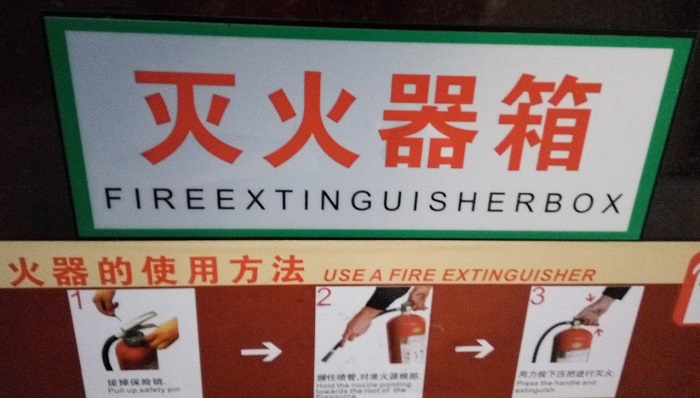
I suppose now you’d have a better idea about “fire” and related basic Chinese words.
That’s all in Lesson 4 of the Chinese Language course.
Feeling confident about the lessons? Cool! Try the Chinese Language Proficiency Test and see how much you now you know Mandarin Chinese. Be brave enough to not look at the answers before evaluating the questions (and of course deciding the answers). 🙂
You can also directly head to the next lesson of the Chinese Language Course or check out the previous lesson again.
Hope it’s now it’s easier to learn Mandarin online. You can check out all lessons from Unit 1.
If you have any question about the basic Chinese words or Chinese language course, feel free to post in our forum so that others could also contribute and learn. For regular updates like us on Facebook, or follow on Twitter!
If you enjoy to learn Chinese language, or find the write-ups useful, don’t forget to buy me a beer!
Happy mandarin Chinese learning.
Last updated: Saturday, March 3, 2018